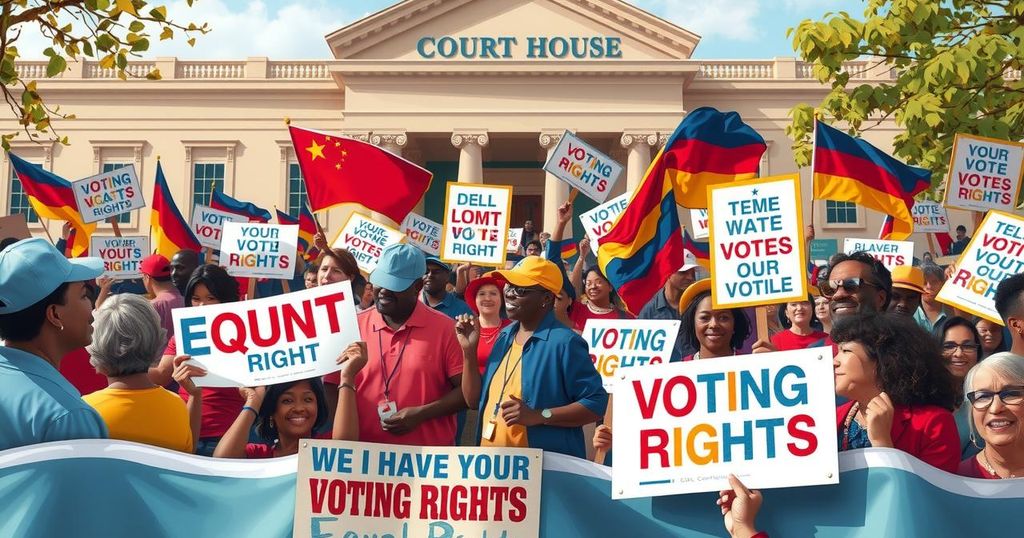A rally was held in Anchorage in support of an American Samoan family charged with voter fraud. The case highlights the voting rights disparities faced by American Samoans, who are U.S. nationals, unlike residents of other territories. The Whittier City Council has called for changes to state election laws, emphasizing the need for equal voting rights.
On Friday, dozens of supporters rallied outside the Anchorage courthouse for a family from Whittier, Alaska, facing voter fraud charges. This case marks a significant moment, as it touches on the broader implications of citizenship rights for American Samoans, who are considered U.S. nationals rather than citizens, which limits their voting rights. The state alleges that these individuals illegally voted in local elections.
Born in American Samoa, the family’s legal troubles arose from their status as non-citizens, which is unique compared to residents born in other U.S. territories like Puerto Rico and Guam, where citizenship is automatic. Prosecutors claim the family misrepresented their voting eligibility on official documents, leading to felony charges that could result in prison sentences of up to ten years for some.
Adding to the mix, the Whittier City Council recently passed a resolution urging the state to revise the constitution to allow those born in U.S. territories to vote in state and local elections. The resolution emphasized support for equal voting rights for all citizens of the U.S. and its territories, including American Samoa residents.
Neil Weare, co-founder of Right to Democracy, remarked that this prosecution is the first targeting American Samoans specifically because of where they were born. His organization has stepped in to support Tupe Smith, the first family member charged with voting fraud, and sent attorneys to Alaska for the proceedings.
At the rally, participants held a prayer, sang traditional songs, and showed their solidarity for the family. Each of the nine family members made their first court appearances in a packed courtroom, entering not guilty pleas. Another family member was not present but is scheduled to appear next week. Public defenders were appointed for several, as financial constraints made hiring private lawyers impossible.
Michael Pese, a chargee and local firefighter, shared frustrations regarding American Samoans’ lack of voting rights despite being subjected to U.S. military drafts. His family’s belief is that American Samoa has long been part of the United States—it’s been a U.S. territory for 125 years, surpassing Alaska’s statehood. He expressed hope that recognition and rights would follow.
Pese’s wife, Tupe, faced initial charges after running for a school board position earlier this year. The family’s commitment to Whittier is strong. “You know, it’s our home,” he stated. Mayor Dan Blair attended the rally and noted the distress within the community following the abrupt arrival of multiple state troopers investigating the family.
Blair mentioned that over half of Whittier’s school children come from American Samoan backgrounds, indicating a deep community connection. He highlighted that the police action had sown fear among residents, particularly among the younger population.
“It was unsettling for sure,” said Blair, expressing community concerns about what they perceived as an intimidating presence. As this situation unfolds, the interplay between legal charges and community rights continues to generate discussion in Whittier and beyond.
The rally in Anchorage spotlighted the ongoing struggle of American Samoans for equal voting rights as they face felony charges for alleged voter fraud. With support from local government and advocacy groups, this case could significantly impact citizenship discussions in the U.S. While the family stands accused, their legal battles are also rooted in deeper issues surrounding the rights of U.S. nationals and the unique status of American Samoans.
Original Source: www.adn.com






